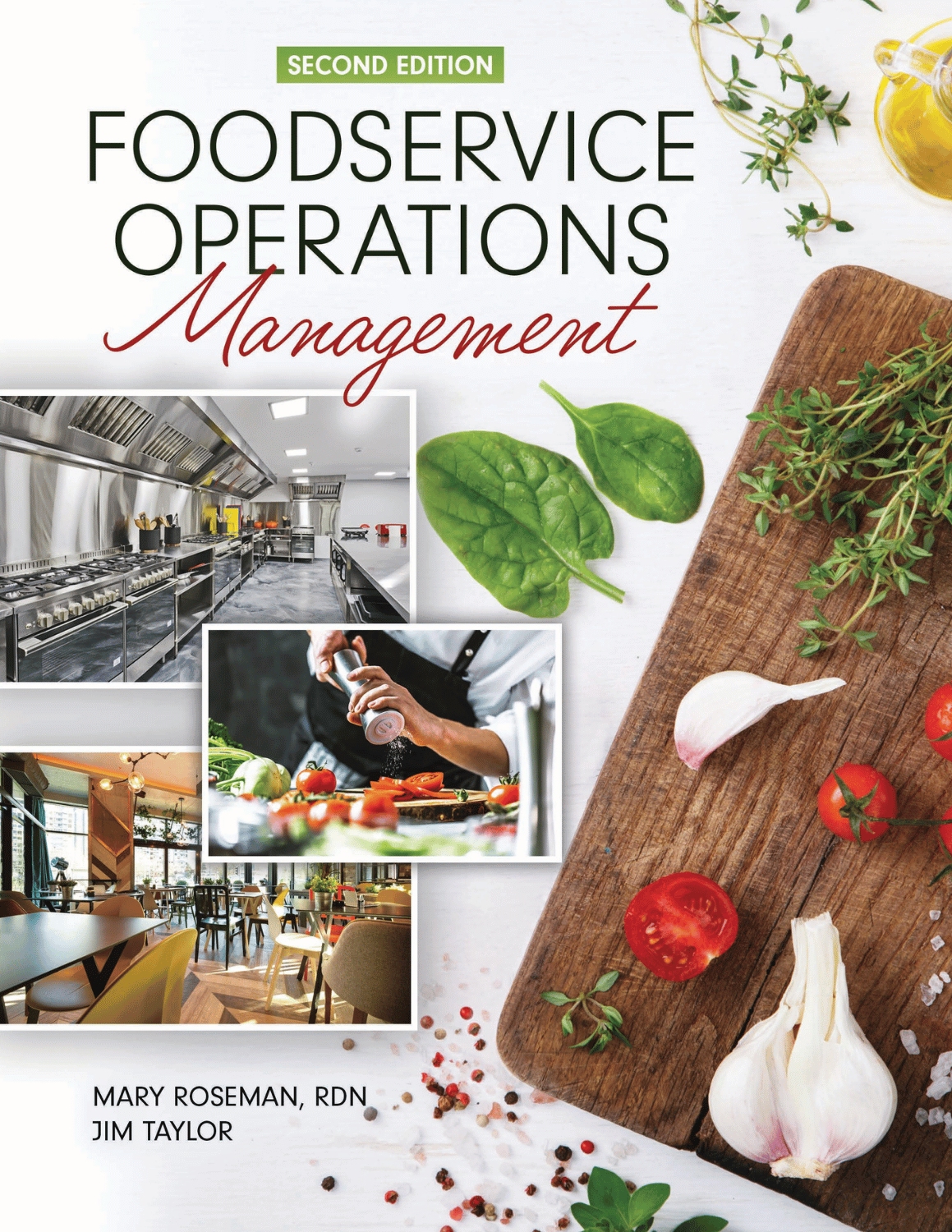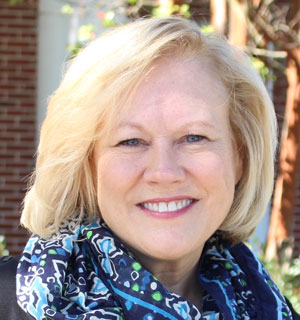Foodservice Operations Management
Author(s): Mary Roseman , James Taylor
Edition: 2
Copyright: 2025
Pages: 454
Edition: 2
Copyright: 2025
Pages: 454
Choose Your Format
Choose Your Platform | Help Me Choose
Now Available!
The new 2nd edition of Foodservice Operations Management now released prepares future nutrition/dietetics, foodservice, and hospitality management professionals with the knowledge and competencies to manage with confidence a multitude of careers in all areas of the foodservice industry. This 2nd edition is jampacked with key information necessary to navigate today’s multi-faceted foodservice settings.
In the new edition, students learn critical-for-success foodservice concepts while going behind the scenes of smooth, sustainable foodservices businesses in a variety of noncommercial and commercial settings. The textbook provides the specific elements of commonality and differences among foodservice types.
Throughout the textbook, the fundamental impact of strong management and leadership on every facet of foodservice operations is provided in the areas of human resources, finances, marketing, facilities management, procurement and production, technology, sustainability, and operating systems and controls. Incapsulated in one textbook, students get comprehensive preparation for foodservice management practices.
The new edition supports the 2022 Standards for the Accreditation Council for Education in Nutrition and Dietetics (ACEND) and the current standards for the Accreditation Commission for programs in Hospitality Administration (ACPHA). Thirteen KRDNs and twenty-five CRDN topics required by ACEND are covered.
In addition, seven case studies based on real-world foodservice operations are included with the textbook for student assignments on KRDN and CRDN topics with more to be added during the Spring of 2025:
1. Technology and quality improvements
2. Sustainability and waste management
3. Budget and financial management
4. Risk management
5. Cultural differences, sensitivity, and biases
6. Mentorship
7. Change management
Chapter 1 Foodservice: It Begins with the Menu
Chapter 2 Menu Development
Chapter 3 Menu Nutritional Considerations
Chapter 4 Types of Commercial Foodservice Operations
Chapter 5 Types of Noncommercial Foodservice Operations
Chapter 6 Types of Service
Chapter 7 Management and Leadership of Foodservice Operations
Chapter 8 Human Resources Management
Chapter 9 Marketing of Foodservice Operations
Chapter 10 Technology
Chapter 11 Facilities Management
Chapter 12 Sustainability
Chapter 13 Procurement, Storage, and Production
Chapter 14 Financial Management
Chapter 15 Foodservice Operating Systems and Controls
Appendix Sustainable Foodservice Learnings from Covid-19
Dr. Mary Roseman is professor at the University of Mississippi in the School of Applied Sciences, Department of Nutrition and Hospitality Management and for over 40 years has been a registered dietitian. Aft er obtaining a BS degree in food and nutrition from Western Kentucky University and a dietetic internship from Oklahoma State University, she began her professional foodservice career as an assistant director of foodservice overseeing all aspects of the University of Central Oklahoma’s foodservice system. Aft er obtaining an MBA from the University of Central Oklahoma and a PhD in food systems management from Oklahoma State University, she spent 13 years in the hospitality industry at the corporate offi ce of an international quick service restaurant company in mid- and upper management positions in the areas of human resources and marketing. Prior to the University of Mississippi, she was an assistant and associate professor in the Department of Dietetics and Human Nutrition at the University of Kentucky. Her foodservice and hospitality experiences, along with her teaching and scholarship, have provided her a unique, practical, and applied set of skills and understanding of foodservice that have been incorporated into the textbook.
Dr. Roseman is one of only a few individuals in the United States who have been actively engaged in both the hospitality and dietetic/nutrition sectors in teaching, research, and service. She has organized and led pedagogical workshops on foodservice topics and presented research papers and posters at international, national, and regional professional conferences. She has been an invited presenter at national webinars for dietetics and hospitality organizations and has served in various national leadership positions and activities for dietetic practice groups with the Academy of Nutrition and Dietetics; International Council on Hotel, Restaurant and Institutional Education; Accreditation Council for Education in Nutrition and Dietetics; Accreditation Commission for Programs in Hospitality Administration; and Foodservice Systems Management Education Council.
Dr. Jim Taylor is an associate professor at the University of Mississippi in the School of Applied Sciences, Department of Nutrition and Hospitality Management. Aft er obtaining a BS degree in finance from Th e University of Southern Mississippi (USM), he continued his culinary career working to the level of executive chef of both casual and fine dining establishments. Aft er obtaining an MBA from the University of South Florida, he managed regional and national full-service themed chain restaurants. In addition to managing stand-alone restaurants, he held the position of food and beverage director of an upstart casino, developing and opening four foodservice outlets. While earning his PhD in nutrition and food systems with a minor in research methods and teaching hospitality management at USM, he consulted with various foodservice venues, including restaurants, casinos, and convention services. In total, he provided management leadership in foodservice operations to various business segments for over two decades.
Along with teaching at USM for eight years, Dr. Taylor spent time at Western Carolina University and has been at The University of Mississippi for almost two decades. His research has encompassed menu management, consumer behavior, human resources, and alcoholic beverage consumption preferences among other hospitality-related topics. His course teaching has covered both undergraduate and graduate courses in foodservice, hospitality accounting, and financial management.
Now Available!
The new 2nd edition of Foodservice Operations Management now released prepares future nutrition/dietetics, foodservice, and hospitality management professionals with the knowledge and competencies to manage with confidence a multitude of careers in all areas of the foodservice industry. This 2nd edition is jampacked with key information necessary to navigate today’s multi-faceted foodservice settings.
In the new edition, students learn critical-for-success foodservice concepts while going behind the scenes of smooth, sustainable foodservices businesses in a variety of noncommercial and commercial settings. The textbook provides the specific elements of commonality and differences among foodservice types.
Throughout the textbook, the fundamental impact of strong management and leadership on every facet of foodservice operations is provided in the areas of human resources, finances, marketing, facilities management, procurement and production, technology, sustainability, and operating systems and controls. Incapsulated in one textbook, students get comprehensive preparation for foodservice management practices.
The new edition supports the 2022 Standards for the Accreditation Council for Education in Nutrition and Dietetics (ACEND) and the current standards for the Accreditation Commission for programs in Hospitality Administration (ACPHA). Thirteen KRDNs and twenty-five CRDN topics required by ACEND are covered.
In addition, seven case studies based on real-world foodservice operations are included with the textbook for student assignments on KRDN and CRDN topics with more to be added during the Spring of 2025:
1. Technology and quality improvements
2. Sustainability and waste management
3. Budget and financial management
4. Risk management
5. Cultural differences, sensitivity, and biases
6. Mentorship
7. Change management
Chapter 1 Foodservice: It Begins with the Menu
Chapter 2 Menu Development
Chapter 3 Menu Nutritional Considerations
Chapter 4 Types of Commercial Foodservice Operations
Chapter 5 Types of Noncommercial Foodservice Operations
Chapter 6 Types of Service
Chapter 7 Management and Leadership of Foodservice Operations
Chapter 8 Human Resources Management
Chapter 9 Marketing of Foodservice Operations
Chapter 10 Technology
Chapter 11 Facilities Management
Chapter 12 Sustainability
Chapter 13 Procurement, Storage, and Production
Chapter 14 Financial Management
Chapter 15 Foodservice Operating Systems and Controls
Appendix Sustainable Foodservice Learnings from Covid-19
Dr. Mary Roseman is professor at the University of Mississippi in the School of Applied Sciences, Department of Nutrition and Hospitality Management and for over 40 years has been a registered dietitian. Aft er obtaining a BS degree in food and nutrition from Western Kentucky University and a dietetic internship from Oklahoma State University, she began her professional foodservice career as an assistant director of foodservice overseeing all aspects of the University of Central Oklahoma’s foodservice system. Aft er obtaining an MBA from the University of Central Oklahoma and a PhD in food systems management from Oklahoma State University, she spent 13 years in the hospitality industry at the corporate offi ce of an international quick service restaurant company in mid- and upper management positions in the areas of human resources and marketing. Prior to the University of Mississippi, she was an assistant and associate professor in the Department of Dietetics and Human Nutrition at the University of Kentucky. Her foodservice and hospitality experiences, along with her teaching and scholarship, have provided her a unique, practical, and applied set of skills and understanding of foodservice that have been incorporated into the textbook.
Dr. Roseman is one of only a few individuals in the United States who have been actively engaged in both the hospitality and dietetic/nutrition sectors in teaching, research, and service. She has organized and led pedagogical workshops on foodservice topics and presented research papers and posters at international, national, and regional professional conferences. She has been an invited presenter at national webinars for dietetics and hospitality organizations and has served in various national leadership positions and activities for dietetic practice groups with the Academy of Nutrition and Dietetics; International Council on Hotel, Restaurant and Institutional Education; Accreditation Council for Education in Nutrition and Dietetics; Accreditation Commission for Programs in Hospitality Administration; and Foodservice Systems Management Education Council.
Dr. Jim Taylor is an associate professor at the University of Mississippi in the School of Applied Sciences, Department of Nutrition and Hospitality Management. Aft er obtaining a BS degree in finance from Th e University of Southern Mississippi (USM), he continued his culinary career working to the level of executive chef of both casual and fine dining establishments. Aft er obtaining an MBA from the University of South Florida, he managed regional and national full-service themed chain restaurants. In addition to managing stand-alone restaurants, he held the position of food and beverage director of an upstart casino, developing and opening four foodservice outlets. While earning his PhD in nutrition and food systems with a minor in research methods and teaching hospitality management at USM, he consulted with various foodservice venues, including restaurants, casinos, and convention services. In total, he provided management leadership in foodservice operations to various business segments for over two decades.
Along with teaching at USM for eight years, Dr. Taylor spent time at Western Carolina University and has been at The University of Mississippi for almost two decades. His research has encompassed menu management, consumer behavior, human resources, and alcoholic beverage consumption preferences among other hospitality-related topics. His course teaching has covered both undergraduate and graduate courses in foodservice, hospitality accounting, and financial management.





